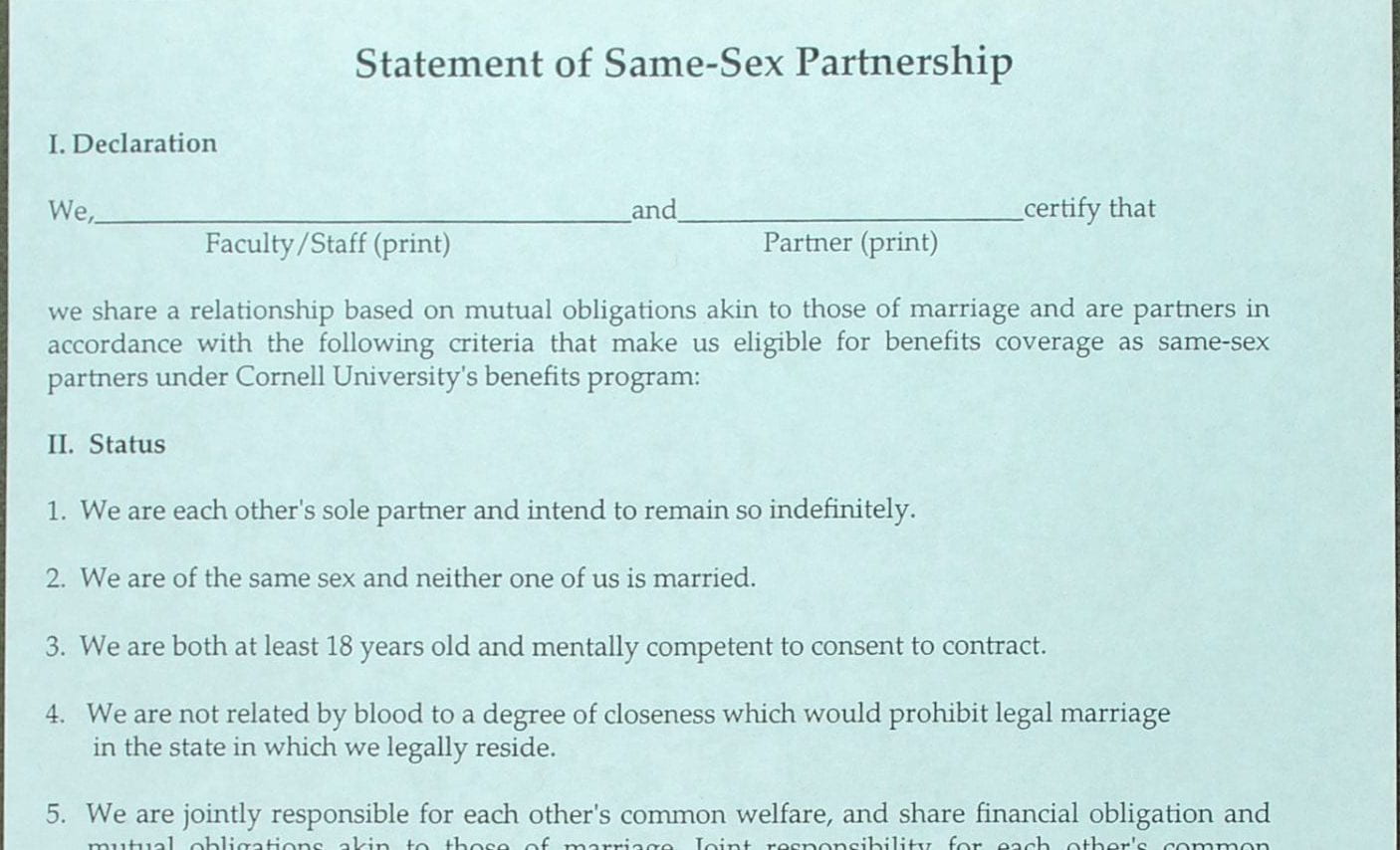by Andy Colpitts, PhD Student in Performing and Media Arts
Beginning on July 1, 1994, gay and lesbian faculty and staff at Cornell were able to extend their employee benefits to their same-sex partners and their children by signing a simple sheet of paper. The “Statement of Same-Sex Partnership” was the crux of Cornell’s new policy that sought to extend equity to queer faculty and staff who were in relationships “akin to marriage.” Modeled after equivalent practices from Stanford, the University of Chicago and several other Ivy League institutions, this document stipulated that same-sex partners must be in an exclusive relationship and demonstrate a level of financial interdependence. Couples that signed this form would be able to take advantage of university employee healthcare, accidental death and dismemberment insurance, Children’s Tuition Scholarship, and library and gym access.
The work to establish this policy was undertaken by an LGBT working group that included students from the LGBT Coalition, faculty, staff and administrators. However, this group, formed in 1993, did not merely ignite out of a spark of progressive inspiration, but in response to criticism levied at the university. In April 1992, Cornell made local headlines for housing and benefits policies that students decried as homophobic and illegal under Tompkins County’s new Fair Practice Law, passed in December 1991, which prohibited discrimination on the basis of sexual preference. Within two years, however, Cornell took steps to address these reproaches.
While this policy was largely well received, certain hurdles and shortcomings presented themselves right away. For example, health benefits were extended only to those faculty and staff working in the endowed (i.e. private) colleges, as the public branches of the university used New York’s Empire healthcare, which had no provision for same-sex couples. Moreover, because same-sex couples were still unable to file joint tax returns, the cost of a same-sex partner’s healthcare was, in most cases, treated as taxable income, raising the employee’s overall tax burden.
Finally, while the policy covered unmarried homosexual couples, unmarried heterosexual couples were ineligible. Again, following the example of other universities that had adopted similar policies, this was justified by the notion that straight couples had the legal option to get married. Nevertheless, some argued that this opened the university up to court challenges based on unequal treatment and failed to address other non-traditional family structures. As such, the Statement of Same-Sex Partnership may be understood as one segment in a lineage of policies that sought to legitimize nonmarital LGBT relationships through “marriage-like” unions and which, as legal scholar Douglas NeJaime argues, ultimately served to bolster the centrality of marriage in queer advocacy. It would appear that, despite converse intentions, Cornell continued to, as an editorial in the Ithaca Journal put it, “pass judgement on what makes a family.”
Sources
Collison, Michelle N. K. “Benefits for Gay Couples.” Chronicle of Higher Education, November 3, 1993.
Doolittle, Nancy. “Cornell University Expands Benefits to Same-Sex Partners.” The Cornell Workplace, 3 no. 22 (June 2, 1994).
Grace-Kobas, Linda. “Benefits policy to cover same-sex partners.” The Cornell Chronicle, 25 no. 36 (June 9, 1994).
Haider, Ted. “Cornell’s same-sex policy: Step forward, step back.” Ithaca Journal (Ithaca, NY), June 7, 1994.
Hargrove, Steven N. “Domestic Partnership Benefits: Redefining Family in the Workplace.” Loyola Consumer Law Review 6, no. 2 (1994).
Hovis, Kathy. “Gay rights law is a top local story.” Ithaca Journal (Ithaca, NY), January 1, 1992.
NeJaime, Douglas. “Before Marriage: The Unexplored History of Nonmarital Recognition and Its Relations to Marriage.” California Law Review, 102 no. 1 (February 2014).
Tokasz, Jay. “Same-sex benefits possible at Cornell.” Ithaca Journal (Ithaca, NY), March 14, 1994.
Tokasz, Jay. “New Cornell deal will give benefits to same-sex partners.” Ithaca Journal (Ithaca, NY), June 3, 1994.
Tokasz, Jay. “Moving toward health coverage for same-sex partners.” Ithaca Journal (Ithaca, NY), July 2, 1994.
Yaremko, Marci. “Gays, lesbians say CU housing policy illegal.” Ithaca Journal (Ithaca, NY), April 13, 1992.
Yaremko, Marci. “Health, other benefits also at issue at CU.” Ithaca Journal (Ithaca, NY), April 13, 1992.


